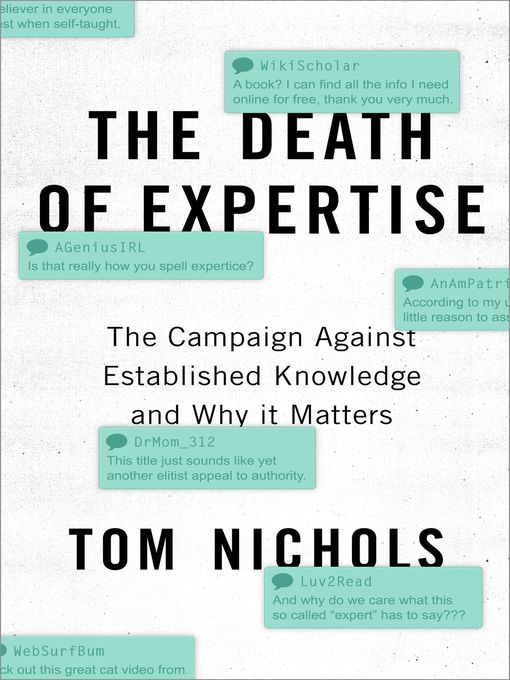
The Death of Expertise
The Campaign against Established Knowledge and Why it Matters
کتاب های مرتبط
- اطلاعات
- نقد و بررسی
- دیدگاه کاربران
نقد و بررسی

December 12, 2016
Nichols (Eve of Destruction: The Coming Age of Preventive War) expands his 2014 article published by The Federalist with a highly researched and impassioned book that’s well timed for this post-election period. The crux of the book’s argument is that people—specifically in the American public—have grown increasingly hostile to expertise. Nichols explores the sources of this hostility (“some of which are rooted in human nature, others that are unique to America and some that are unavoidable product of modernity and affluence”), discusses the notion of “expert,” and considers the devastating consequences of the loss of trust on democratic institutions. He blames changes in higher education, the explosion and fracturing of media outlets, and confirmation bias and other psychological effects of an oversaturated media environment. Generally, Nichols displays strong reasoning, but at times he goes off the rails. It takes some time in the sections on education and Google, for instance, for him to make his point. Otherwise, this strongly researched textbook for laymen will have many political and news junkies nodding their heads in agreement.

January 1, 2017
Some fresh twists on a familiar theme: the dumbing down of America amid the defiant distrust of expertise.As a veteran governmental adviser and think-tank participant, Nichols (National Security Affairs/U.S. Naval War Coll.; No Use: Nuclear Weapons and U.S. National Security, 2013, etc.) has experienced firsthand the decline of respect accorded specialists in many disciplines, as the internet has leveled the playing field to the point where all opinions are more or less considered equal, and a Google search substitutes for decades of research. "These are dangerous times," he writes. "Never have so many people had access to so much knowledge, and yet been so resistant to learning anything," However, the author sounds less like an alarmist than like a genial guide through the wilderness of ignorance. There are no startling revelations. Media in general and social media in particular tend to function as echo chambers, reinforcing biases. Some of those whose conclusions are the shakiest tend to shout the loudest, basing their arguments on spurious evidence. Credentials are suspect in an age when university degrees are everywhere, grade inflation runs rampant, and colleges woo prospective students as customers and clients. Little wonder, then, that "if in a previous era too much deference was paid to experts, today there is little deference paid to anyone at all." Students challenge teachers, patients challenge doctors, and so-called experts argue with other so-called experts (often in territory beyond the expertise of either). "People who claim they are 'experts' are sometimes only about as self-aware as people who think they're good kissers," he writes. Not that Nichols lets the experts off the hook--some hide behind the impenetrability of academic jargon; others have even faked the data or cooked the books. The answer to this pervasive problem lies in greater media literary and in citizens having a better idea as to what they can trust from whom. A sharp analysis of an increasingly pressing problem, but Nichols falls short of proposing a satisfying solution.
COPYRIGHT(2017) Kirkus Reviews, ALL RIGHTS RESERVED.

























دیدگاه کاربران